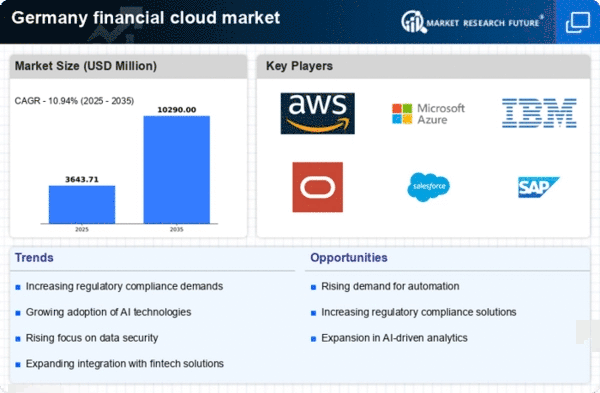Emergence of Fintech Innovations
The rise of fintech companies in Germany is significantly influencing the financial cloud market. These innovative firms are leveraging cloud technologies to deliver agile and customer-centric financial services. By utilizing cloud infrastructure, fintechs can rapidly develop and deploy new products, enhancing their competitive edge. In 2025, it is projected that fintechs will account for over 25% of the financial services market in Germany, further driving the demand for cloud solutions. This trend indicates a shift towards more flexible and scalable financial services, compelling traditional institutions to adopt cloud technologies to keep pace with these agile competitors.
Increased Focus on Cost Efficiency
Cost efficiency remains a pivotal driver for the financial cloud market in Germany. Financial institutions are under constant pressure to reduce operational costs while maintaining high service quality. By migrating to cloud-based solutions, organizations can significantly lower their IT expenditures, as they eliminate the need for extensive on-premises infrastructure. Reports indicate that companies can save up to 30% on IT costs by leveraging cloud services. This financial incentive is compelling, particularly for smaller institutions that may lack the resources for large-scale IT investments. Consequently, the financial cloud market is poised for growth as more organizations recognize the potential for cost savings through cloud adoption.
Enhanced Data Analytics Capabilities
Data analytics is becoming increasingly vital in the financial cloud market, as organizations seek to harness the power of big data for strategic decision-making. The ability to analyze vast amounts of data in real-time allows financial institutions to gain insights into customer behavior, market trends, and operational efficiencies. In Germany, it is anticipated that the adoption of cloud-based analytics solutions will grow by 40% by 2026. This growth is driven by the need for data-driven strategies that can enhance customer experiences and optimize service delivery. As a result, the financial cloud market is likely to expand as institutions invest in advanced analytics capabilities to remain competitive.
Growing Demand for Digital Transformation
The financial cloud market in Germany is experiencing a notable surge in demand driven by the ongoing digital transformation across various sectors. Organizations are increasingly seeking to enhance operational efficiency and customer engagement through cloud-based solutions. In 2025, it is estimated that approximately 70% of financial institutions in Germany will have adopted cloud technologies to streamline their processes. This shift not only facilitates real-time data access but also enables better analytics capabilities, which are crucial for informed decision-making. As businesses strive to remain competitive, the financial cloud market is likely to benefit from this trend, as firms invest in innovative technologies to meet evolving customer expectations.
Regulatory Compliance and Risk Management
In the financial cloud market, regulatory compliance is a critical concern for institutions operating in Germany. The stringent regulatory landscape necessitates that financial organizations adopt solutions that ensure data security and compliance with local laws. As regulations evolve, the demand for cloud services that offer robust compliance features is likely to increase. Financial institutions are expected to invest heavily in cloud solutions that provide advanced security measures, such as encryption and access controls, to mitigate risks associated with data breaches. This focus on compliance not only protects organizations from potential fines but also enhances their reputation, thereby driving growth in the financial cloud market.
















